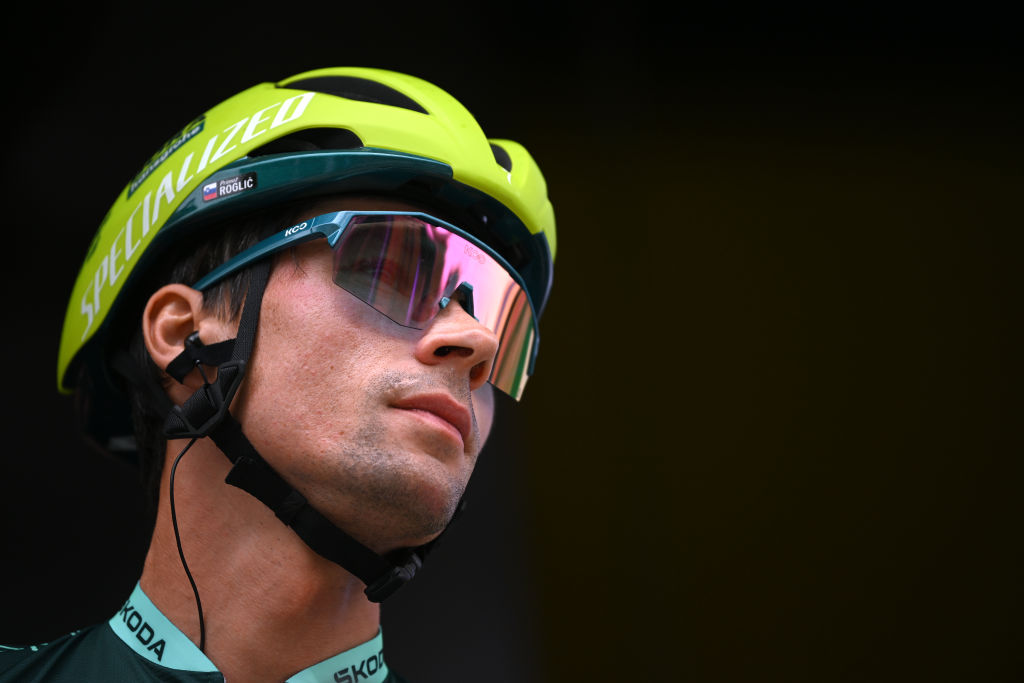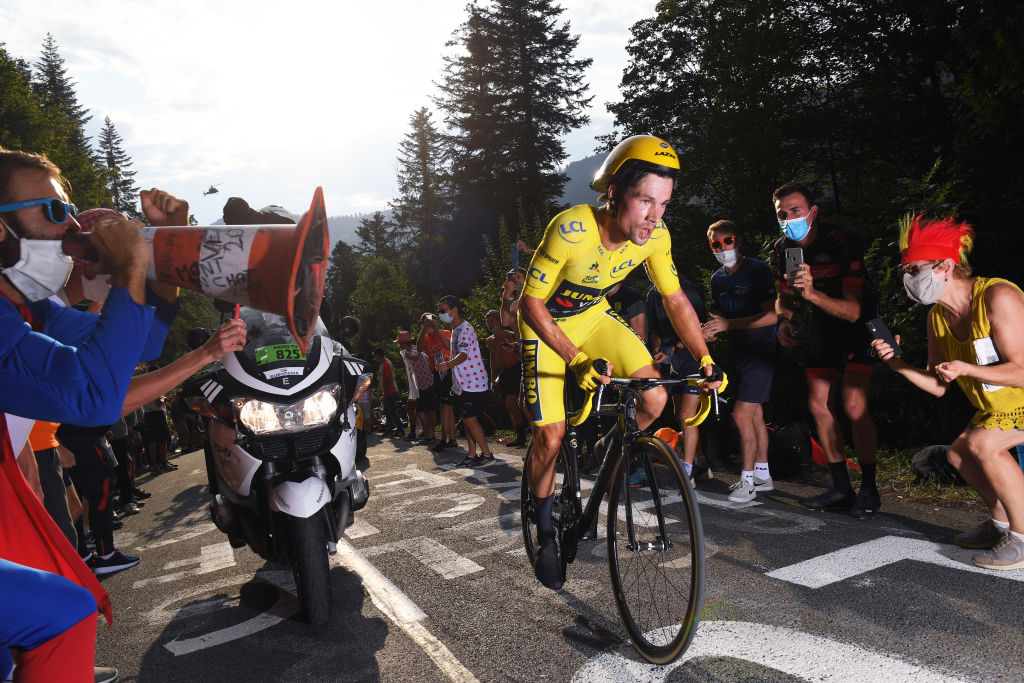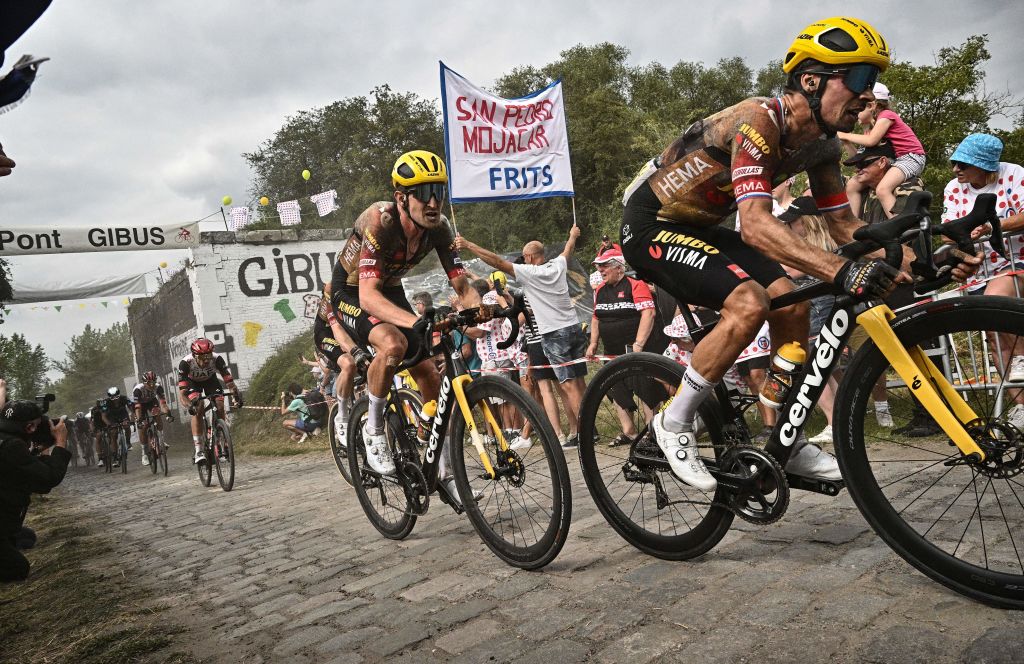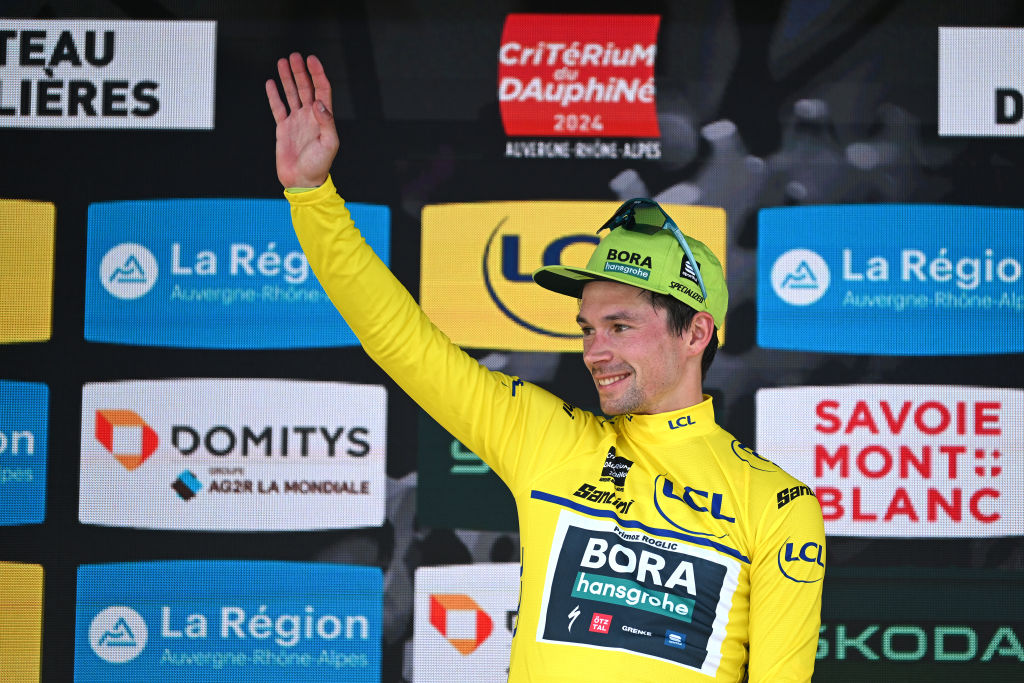
If Primož Roglič finally succeeds in conquering the Tour de France this summer, at 34 years and nine months, he won’t just become the race’s second oldest ever winner. He’ll also have finally laid a good many ghosts of missed opportunities and misfortunes in the Tour, and elsewhere, to rest.
To understand how ill-starred Roglič’s relationship with the Tour has been, you have to rewind to 2020, of course, and how clearly he looked to be on track to victory that year. Indeed, when he crossed the finish line to claim the stage 4 win at Orcieres-Merlette - which, amazingly for a rider as successful as Roglič, remains his most recent victory at the Tour - it had all the feel of a hefty down payment on a serious bid to triumph overall.
Yet with uncanny similarity to the fate that befell the first-ever winner in the Alpine ski station, Luis Ocaña in 1971, Roglič ended up in yellow overall, only to have victory wrenched from him in the most unexpected, and brutal fashion. At Orcieres-Merlette, Ocaña inflicted the most stinging defeat that Eddy Merckx would, by his own admission, ever experience in the Tour, moving into a seemingly unassailable lead. But then a crash on the Col de Menté (also tackled in this year’s race, as it happens) forced the Spaniard to abandon. So when 49 years later and just when he thought victory was all but a formality, Roglič was left reeling on the Planche des Belles Filles time trial and courtesy of Tadej Pogačar, the parallels with the Spanish star's disaster were obvious.
Since then, and in some ways like Ocaña, the sense that Roglič has been pursued by misfortune in the Tour (and elsewhere) is hard to avoid. That’s despite the Slovenian creating a stunning palmares across the Vuelta a España, Olympic Games, Giro d’Italia and a plethora of week-long stage races.
Since 2020 at the Tour, Roglič’s track record has consisted of two abandons (2021 and 2022) because of crashes and injuries, and one DNS because his ambitions had been sidelined by the rise of Jumbo-Visma's leader Jonas Vingegaard. But even when Roglič has won top races, there have often been nailbiting finales.
He has either teetered too close towards disasters not of his own making - witness the last-minute mechanical in last year’s Giro d’Italia, that risked costing him the race - or suffered last-minute fatigue, like in the last Critérium du Dauphiné, which he almost lost when he all but cracked on the last day.

Nothing succeeds like failure
"There's no success like failure," Bob Dylan once sang on Love Like Zero, and nothing like losing does more to endear a top rider to the fans, as Roglič could witness after his shock defeat at La Planche des Belles Filles. But his brave battles against what proved to be inevitable abandons in the 2021 and 2022 Tours - the latter sparked after hitting a safety haybale on the cobbled stage, dislocating his shoulder (and popping it back into place himself) - have also gained him multiple supporters.
The bizarre crash that knocked him out of the 2022 Vuelta a España, just when he seemed to be on the point of regaining the upper hand against Remco Evenepoel, added yet another layer to the aura of what-might-have-beens that surrounds the Slovenian in Grand Tours. Make no mistake, Roglič’s track record in all three Grand Tours is hugely impressive. But the parallels with Tony Rominger, the 1990s star who had an identical (to date) track record of three Vueltas wins, a lone Giro triumph and a second place overall in the Tour de France as his best results in each, are also unmissable.
Which brings us to this year’s Tour de France and Roglič’s bid to complete his set of Grand Tour victories. Always equable and blessed with a fine sense of laconic humour in interviews, it’s sometimes hard to perceive a sense of unfinished business or driving ambition in the Slovenian. But if his resistance to the litany of injuries that dogged him in so many Grand Tour crashes is one indication of his determination to go on winning no matter the cost, so, too, was his decision to quit Jumbo-Visma after eight seasons and embark on a new adventure with Bora-Hansgrohe.
There was plenty of speculation that Roglič moved on because of the situation in the Vuelta a Espana, where he was superceded, partly due to team politics, by eventual winner and teammate Sepp Kuss, while Jonas Vingegaard claimed second overall. But as Roglič saw it, it was time to move on anyway.
"A few years earlier, I taught Jonas and Sepp everything, they still looked up to me, and now they were numbers 1 and 2 for me," Roglič said to Cyclingnews over the winter. "We made history, and I was part of it.”
”But even if I had won the Vuelta, I would have left. I simply have greater opportunities elsewhere to achieve what I am still fighting for. That wasn't a tough decision but rather a natural one.”

Onto the Dauphiné
It seems harsh to say it, but a smooth build-up to the Tour de France this year would have almost felt un-natural for Roglič, even if the squad have deliberately modelled his entire season to be as lowkey as possible and ensure he got to the Tour as fresh as possible. Instead, the adaption process to the new home at Bora-Hansgrohe took longer than anticipated, including a very rough Paris-Nice. “We underestimated that, Paris-Nice was a complete disaster” was how team manager Rolf Aldag described it to Het Laatste Nieuws.
And then, while leading Itzulia-Basque Country, the same crash that poleaxed Jonas Vingegaard and Remco Evenepoel forced his abandon with multiple injuries - none of them fractures, but nonetheless leaving him in considerable pain and obliging him to miss Liège-Bastogne-Liège.
“After Paris-Nice we knew we had to revise a lot and in Itzulia we felt we were getting things back in order,” Aldag told Het Laatste Nieuws. “Primož won the opening time trial and we got a routine going, but we’d have liked to have known where he would have finished on GC.”
Fast forward to the Critérium du Dauphiné, and the signs have been very positive, with a second overall victory, back-to-back mountain stage wins and a team in fine fettle, most notably ultra-talented climber Aleksandr Vlasov.
If the fallout from two crashes and a last-minute wobble on the final stage provided some question marks in France, the collective omens could hardly be bettered. As his teammate Vlasov put it: “Primož can win the Tour.”
Even if the Slovenian looked manifestly superior to one of his key rivals for July, Remco Evenepoel (Soudal-QuickStep) at the Dauphiné, his climbing performance was markedly less dominant than, say, Jonas Vingegaard in the same race the year before. The Dane is not the only obstacle between Roglič and yellow in Paris, either. On the strength of his racing in the Dauphiné alone, it was hard to be fully convinced that Roglič will be able to shed his 2020 nemesis, Tadej Pogačar (UAE Team Emirates) at the drop of a hat on the major Alpine climbs this July, either.
There has been time for Roglič to gain extra percentage points in his climbing performances, in the last three weeks, though. As a former Olympic champion in the speciality with multiple TT wins in both the Giro and Vuelta, he is hardly likely to find the prospect of this year’s exceptionally high total of 59 kilometres against the clock in the Tour that daunting, either. Previous worries that he has not had much time to get used to riding with Bora-Hansgrohe as a team, given the dearth of his race days, seem to have been eliminated in the Dauphiné. As with everything, of course, the Tour itself will be the crunch litmus test of that.
But maybe above all, Roglič needs to avoid the misfortune that has all too often been a factor in his previous Tours de France. If that happens, one always has the sense with Roglič (and his four Grand Tour victories are ample proof) that anything is possible.
And it's perhaps worth remembering that even Luis Ocaña, a far unluckier rider than Roglič - "He was almost cursed," Ocaña's teammate Michael Wright once said - finally bounced back from his 1971 Tour de France defeat to win the Tour outright, in 1973.

Get unlimited access to all of our coverage of the Tour de France - including journalists reporting, breaking news and analysis on the ground from every stage of the race as it happens and more. Find out more.







